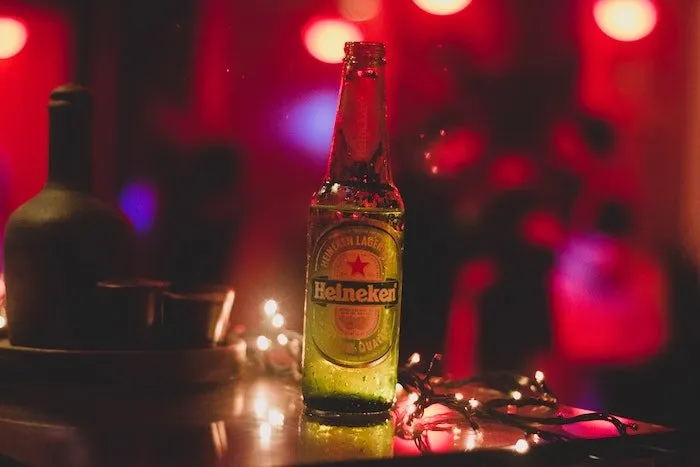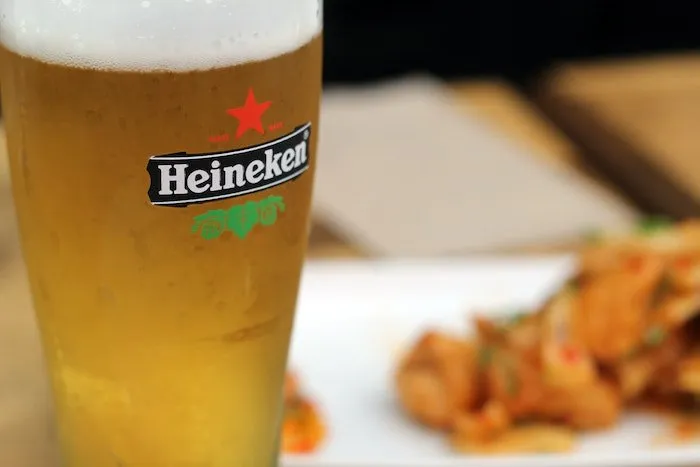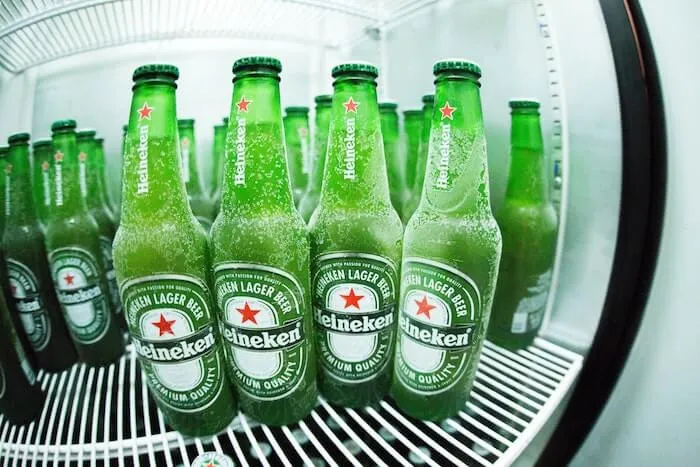Does Heineken Zero have alcohol? This article will investigate the puzzle of whether Heineken Zero contains alcohol, a question that has captivated both beer lovers and health-minded consumers.
We’ll discuss the legal controversy surrounding Heineken Zero’s alcohol content and how it aligns with the U.S. government’s definition of “non-alcoholic.” Furthermore, we’ll explore its health benefits by comparing sugar levels and calorie counts to traditional beers on the market.
As American consumption of alcoholic beverages declines, we’ll examine market potential for non-alcoholic beers like Heineken 0 within premium crafted beverage industry growth opportunities.
Lastly, our analysis will cover Heineken USA’s #NowYouCan campaign strategies that cater to responsible drinking trends while maintaining consumer appeal in a competitive landscape.
Join us as we investigate whether or not does Heineken Zero have alcohol and unveil what sets it apart from other options in today’s ever-evolving beer scene.
Table of Contents:
- Heineken Zero’s Alcohol Content
- Legal controversy surrounding Heineken Zero’s alcohol content
- The U.S. government’s definition of “non-alcoholic”
- Health Benefits and Nutritional Information
- Market Potential for Non-Alcoholic Beers
- #NowYouCan Campaign and Consumer Appeal
- Frequently Asked Questions Does Heineken Zero Have Alcohol
- Conclusion
Heineken Zero’s Alcohol Content

Heineken Zero, promoted as an alcohol-free beer, contains a ABV of less than 0.03%. This falls within the U.S. government’s definition of “non-alcoholic”, which allows for beverages with up to 0.5% ABV. Despite facing legal challenges regarding its alcoholic content or lack thereof, it aims to provide an alternative option for those interested in craft beers without intoxicating effects.
Legal controversy surrounding Heineken Zero’s alcohol content
In recent years, there have been several lawsuits filed against Heineken over their marketing of Heineken Zero as a completely non-alcoholic beverage due to its trace amounts of alcohol (source). However, these cases were ultimately dismissed because the product still falls under the U.S. government’s classification for “non-alcoholic” drinks.
The U.S. government’s definition of “non-alcoholic” is the following:
- Non-Alcoholic: Beverages containing less than 0.5% ABV are considered nonalcoholic according to federal regulations (source) and can be legally sold and consumed by minors.
- “Low Alcohol”: Drinks that contain between 0.5% and 1.2% ABV are considered low-alcohol beverages.
- “Reduced Alcohol”: These drinks have a lower alcohol content than the standard version of the same beverage, but still contain more than 1.2% ABV.
This classification allows Heineken Zero to be marketed as a non-alcoholic beer option for those looking to enjoy craft beers without the potential negative effects of alcohol consumption.
Moving forward, it is important to understand the health benefits and nutritional information associated with Heineken Zero in order to make an informed decision when choosing a beer option.
Health Benefits and Nutritional Information
Heineken Zero, with its low alcohol content, offers various health benefits and nutritional advantages compared to traditional beers. Its unique composition makes it an attractive option for those who are conscious about their calorie intake or looking to reduce their sugar consumption.
Low Sugar Content Compared to Traditional Beers
The sugar content in Heineken Zero is significantly lower than that of regular beer options. Heineken Zero offers a healthier alternative to those worried about the effects of an excessive sugar intake, with only 4.29 grams per can (1.3g/100ml). High-sugar diets have been linked to various health issues, such as obesity, type 2 diabetes, and heart disease. By choosing Heineken Zero over other beers with higher sugar levels, consumers can enjoy a refreshing beverage without compromising their well-being.
Calorie Count Comparison with Other Beer Options
In addition to its low sugar content, Heineken Zero also boasts a reduced calorie count compared to many popular beer choices available in the market today. Containing just 69 calories per bottle, this non-alcoholic brew allows consumers seeking weight management solutions or simply aiming for a balanced diet plan while still enjoying the taste of quality beer.
- Heineken Lager: Approximately 150 calories per bottle
- Budweiser: Approximately 145 calories per bottle
- Guinness Draught: Approximately 125 calories per bottle
- Heineken Zero: Only 69 calories per bottle.
The reduced calorie and sugar content of Heineken Zero make it an appealing choice for health-conscious beer enthusiasts, allowing them to indulge in their favorite beverage without the guilt or potential negative effects on their overall wellness.
For those wanting to lower their sugar intake while still enjoying the taste, Heineken Zero provides nutritional information and health benefits. With the declining American consumption of alcoholic beverages, there are numerous opportunities in the premium crafted beverage industry for non-alcoholic beers like Heineken Zero.
Market Potential for Non-Alcoholic Beers Such As Heineken Zero

Although nonalcoholic beers currently make up a small portion of America’s $112 billion market, there is potential for growth if companies can create products that are comparable in taste and quality to craft beers like imported brews or locally brewed varieties. By offering options like Heineken Zero, brands hope they will give themselves a competitive edge while catering consumers’ evolving preferences.
Declining American Consumption of Alcoholic Beverages
In recent years, the US has experienced a decrease in alcohol consumption as more people adopt healthier lifestyles and practice responsible drinking. According to the National Institute on Alcohol Abuse and Alcoholism (NIAAA), per capita alcohol consumption decreased by 1.6% between 2018 and 2023 alone. This trend suggests an opportunity for non-alcoholic beer manufacturers to capitalize on changing consumer behaviors.
Growth Opportunities in the Premium Crafted Beverage Industry
The proliferation of craft breweries has spurred many customers to pursue novel tastes and premium components in their drinks, regardless of whether they contain alcohol or not. As such, there is growing demand for premium crafted non-alcoholic alternatives that offer similar experiences without intoxicating effects. A report from Grand View Research predicts that the global non-alcoholic beer market will reach $28 billion by 2025, indicating significant room for expansion within this niche.
- Local breweries: As more craft breweries experiment with non-alcoholic options, consumers will have access to a wider variety of flavors and styles that cater to their preferences.
- Imported brews: Imported non-alcoholic beers like Heineken Zero offer unique flavor profiles that may appeal to those who enjoy traditional imported beers but want an alcohol-free option.
Companies are investing in R&D to create quality non-alcoholic beer options, aiming to capitalize on the growing demand and help promote sensible drinking. By doing so, they hope not only to tap into the growing demand for such products but also contribute positively towards promoting responsible drinking habits among consumers.
The market potential for non-alcoholic beers is clear, as the trend towards health conscious and responsible drinking continues to grow. With this in mind, Heineken’s #NowYouCan campaign has been able to capitalize on consumer appeal with their range of alcohol-free options.
Potential for expansion is visible in the US market as individuals look to lead healthier lives and practice responsible drinking. Premium crafted non-alcoholic alternatives are in demand, with a predicted global market of $28 billion by 2025, leading to investment in research and development efforts from companies like Heineken Zero.
#NowYouCan Campaign and Consumer Appeal
Heineken’s innovative marketing approach, the #NowYouCan campaign, is designed to change perceptions about non-alcoholic beers. By showcasing scenarios where you can enjoy an alcohol-free beer as a treat rather than a lesser alternative, Heineken believes there is potential for the non-alcoholic beer market in the US to explode. The launch of Heineken Zero aims at catering to consumers who want a beverage with no alcohol but still enjoy the flavor profile of traditional beers.
Marketing Strategies for Non-Alcoholic Beer Options
The #NowYouCan campaign focuses on promoting responsible drinking while maintaining an enjoyable experience. This includes featuring various social situations such as sports events, barbecues, and work functions where one might typically consume alcoholic beverages but would prefer not to face any negative consequences or feel left out from their peers.
Through engaging advertisements and social media content, Heineken has managed to create buzz around its zero-alcohol offering by highlighting how it enables individuals to partake in these occasions without compromising taste or enjoyment.
Catering to Health-Conscious and Responsible Drinking Trends
In recent years, there has been a growing trend towards health-conscious living which includes reducing alcohol consumption. According to Nielsen data, sales of nonalcoholic beer grew 7% year-over-year between 2018 and 2023 in America alone.
Additionally, many people are seeking ways they can make more responsible choices when it comes to their drinking habits. Heineken Zero, with its low calorie and sugar content, is an attractive option for those looking to maintain a healthier lifestyle while still enjoying the social aspects of consuming beer.
- Low-calorie alternative: With only 69 calories per bottle, Heineken Zero offers a guilt-free choice for individuals watching their caloric intake.
- No alcohol: By containing less than 0.03% ABV, it allows consumers to enjoy the taste of beer without worrying about potential intoxication or other negative effects associated with alcohol consumption.
Frequently Asked Questions Does Heineken Zero Have Alcohol
Are 0 beers actually alcohol free?
Zero-alcohol beers, like Heineken 0.0, are not completely alcohol-free. They contain a minimal amount of alcohol (usually less than 0.5% ABV) due to the brewing process. However, this low level is considered negligible and generally safe for most people.
Is Heineken 0.0% alcohol free halal?
Heineken 0.0 contains trace amounts of alcohol (less than 0.03%) and may not be suitable for strict Halal diets or those who avoid all forms of alcoholic content.
What does Heineken 0.0 have in it?
Heineken 000’s ingredients include water, malted barley, hop extract, natural flavorings and yeast; it has no artificial flavors or additives.
Is Heineken Zero OK for your liver?
In moderation, non-alcoholic beer like Heinenkin Zero, can be better for your liver compared to regular beer since it contains significantly lower levels of ethanol which can cause damage when consumed excessively.
Conclusion
In conclusion, Heineken Zero does not contain any alcohol. This non-alcoholic beer is a great alternative for those looking to enjoy the taste of beer without consuming alcohol. Heineken Zero has no intoxicating effects, despite its branding and flavor profile being similar to alcoholic beverages. The #NowYouCan campaign has been successful in increasing consumer appeal by promoting the idea that people can still enjoy their favorite beers while staying sober.
Discover the best beers for your taste with our comprehensive beer reviews. Get started on creating your own craft brews with our helpful guides and equipment recommendations!
